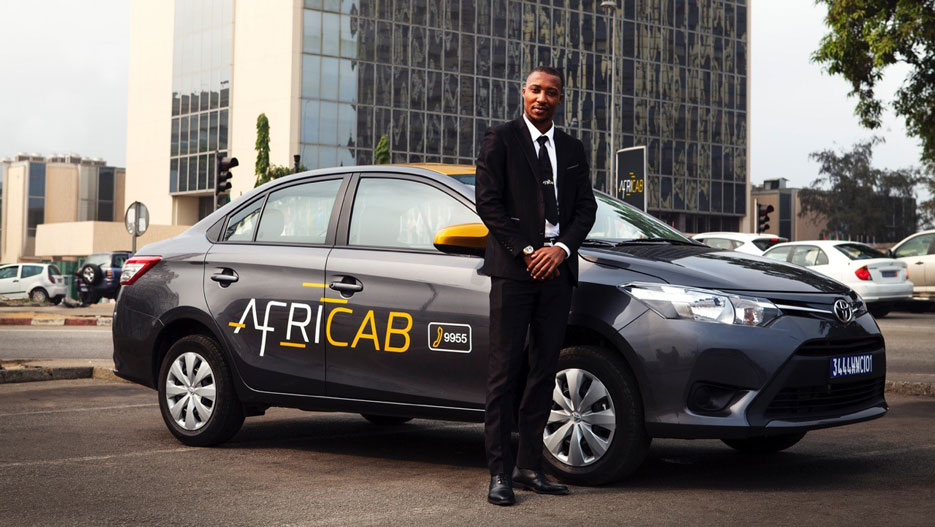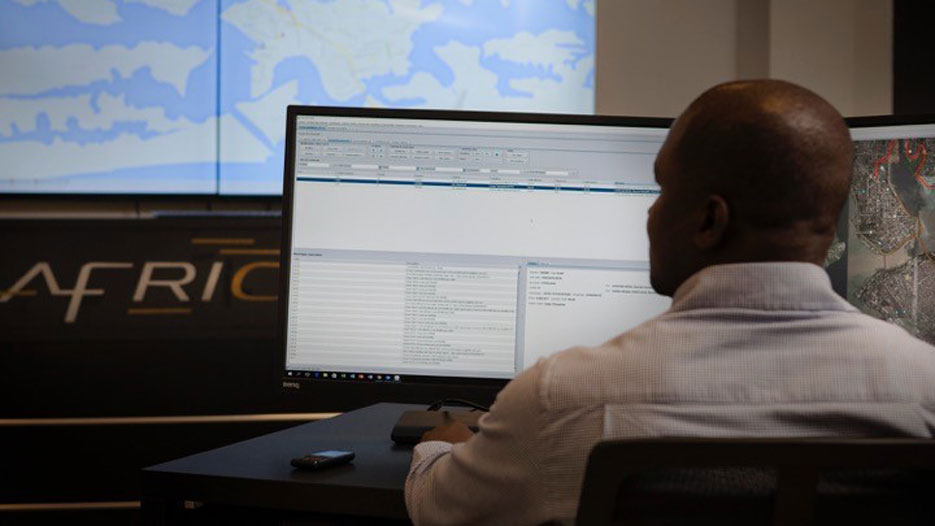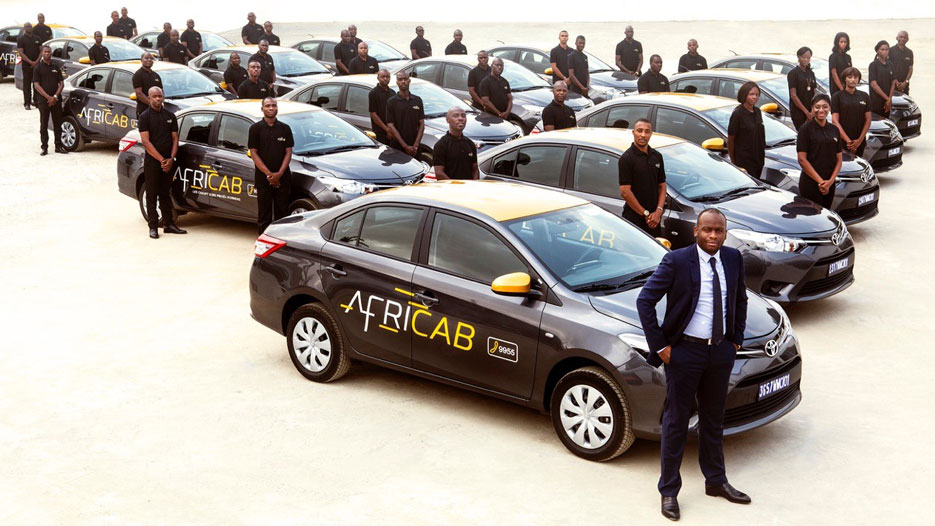Africab: Revolutionizing Transport Services Across Sub-Saharan Africa
The middle class population is growing rapidely in many African nations, but existing transport systems are often unreliable, unsafe or lacking modern facilities that many consumers desire. Vangsy Goma, Founder and CEO of Africab, presents his company, whose goal is to revolutionise passenger transport in sub-Saharan Africa, providing high quality chauffeur-driven transportation.
Interview with Vangsy Goma, Founder and CEO of Africab
Could you give us an overview of the passenger transport sector in Ivory Coast?
Today, the passenger transport sector in Ivory Coast represents around 10,000 vehicles in terms of orange taxis. Then, there are around 3,000 or 4,000 communal taxis, more commonly known here as wôrô-wôrô, which work on the co-driver principle. And now, there is also a completely new activity called VTC (véhicule de transport avec chauffeur), chauffeur-driven transport, which today represents just around 500 vehicles in Ivory Coast, but is a sector that is emerging with more and more players.
Who owns those 500 vehicles? Are they individually-owned or do they belong to companies?
As of now, this activity is still exclusively for individuals. We are the first on the market to also offer this service to businesses, which at first were a bit resistant because most companies already have their own fleet. So it is a matter of gradually raising awareness amongst them to make them understand that they don’t need to have these costly car fleets and pay for men to be chauffeurs, vehicles and maintenance, and that they should rather delegate this aspect to us. Little by little we are changing the sector and allowing companies to use our services.

Could you tell us more about Africab, the services you offer and your vision?
Africab´s vision is to revolutionise passenger transport in sub-Saharan Africa. What we offer today can be divided into two segments. We have our low cost offer, the Black-CAB, which is relatively cheap at just 15% more than current taxi prices. Sometimes we are even cheaper than orange taxis, to go to the airport for example. This segment is for the mass public. Today, the Ivorian middle class is growing and the population has increasing financial means, so we are noticing tremendous success with the middle class who can now enjoy our entry level service. We also have a more prestigious service which we call Presti-CAB and is aimed at a more selective and VIP customer. Furthermore, we perceived that the main source of tourism here in Ivory Coast is currently related to business. So there are large numbers of business people in transit here and our Presti-CAB service is also aimed at them.
What are the advantages that your service offers and that people cannot find anywhere else?
Everybody should try our service because we provide the most amazing and impressive transport in Africa. There is Wi-Fi on board and all our cars are brand new, with air-conditioning. When you enter one of our vehicles, it is like being in your living room. For those who have never been here, it is also the best way to discover Abidjan. Besides, we have excellent driver service: our drivers are qualified and they have all received good training. They are well educated; they can speak English, French and other languages fluently.
Could you tell us about your “my shared success” model?
“My shared success” is about offering everyone the possibility of integrating Africab and what we have to offer. Today we offer people the opportunity to subscribe to Africab and to participate in this small African dragon via Africab Invest. It offers the possibility to individuals to invest in a vehicle and to put it into service with Africab. It will allow us to develop our fleet, meaning better availability, and to provide users with a better service. It will also allow us to create more employment: for each vehicle placed on the market, we create two jobs and give the training which goes along with those jobs.
Everybody should try our service because we provide the most amazing and impressive transport in Africa. There is Wi-Fi on board and all our cars are brand new, with air-conditioning. When you enter one of our vehicles, it is like being in your living room.
The offer is very simple; today you may be an individual who has 8 million FCFA and you want to invest that money in Africab Invest: you buy a vehicle and that vehicle will bring you a monthly income of up to 450,000 FCFA per month. Within 18 months you have made a return on your investment and within 3 years you have doubled your investment. It is an offer that lasts 3 years to begin with, and can be renewed for a 4th optional year. If you take up the 4th year, you will have a return that will be just a little bit lower because the vehicle will be older on the market. But it will allow the chauffeur to purchase the vehicle after the 4th year and so during that year you can share the revenue with the chauffeur 50:50.
We want Africab to invest in social development. It means we can allow people to have a steady employment, earn a living and have an asset that they may not have been able to have previously. This allows individuals to increase their monthly income and people who live in the big African cities to have a communal transport system that meets their expectations.

Does Uber pose a risk to you as a competitor?
I think that Uber´s strategy is very clear and it is global; it is not just about the Ivorian market. Uber´s objective in the medium term is to be present in all cities. I would say that Uber is a competitor like any other. We believe in offering a quality service to all our users and if our service is of such a high quality, our users will always come back to us because they won’t feel the need to look elsewhere. Competition for me is something that is secondary, the better my service is, the more clients I will have, no matter how many competitors are present in the market.
So you are not worried about their arrival?
Well, this steamroller has been landing in all parts of the world but we can also see the limits to the model. Uber has left China today because there are always local realities and you must not underestimate them. You need to have products that adapt to a culture. This is the model we work with, so that we can respond to the demands of the local culture.
What are the main challenges to be faced on a daily basis to meet the growing demand?
The first solution is what I mentioned earlier, Africab Invest, which will allow us to rapidly expand our fleet. The aim is to have more than 300 vehicles in Abidjan by July 2017. In the first phase, we have had more than 50 promises of vehicle purchase. We haven’t officially begun to commercialise yet but it is something that will allow us to very quickly have the number of vehicles to meet the demand.
The second challenge in terms of meeting the demand is the technological challenge. Today, the success of Africab is mainly due to the quality of the service we provide. We want to sell an experience to our users, so that when they get inside an Africab they feel it’s the continuity of their living room. This means they can do the same things they would normally do in their living room: use a tablet to watch videos on YouTube, check the news, or search for the best hotels and places to visit in the city, which makes it also a tourist tool for those who don’t know Abidjan. We have to work on a lot of the technological side of things as that will allow us to improve the client experience. All of our vehicles have Wi-Fi to allow people who have just arrived at the airport and don’t have mobile data to be able to reply to their emails, etc. We are also increasing our local partnerships, particularly with the big hotels such as Accor, so that we accompany their clientele in Abidjan.

Abidjan is the main base but you hope to replicate this model in other capital cities in Africa. Can you tell us more about your expansion plans?
Our main objective is to have a business model that is replicable everywhere in Africa so that our clients find the same standards whether it be in Abidjan, Cotonou, Lomé or Dakar. The aim is to truly be pan-African. Today we are proud to say that we are going to have our first franchise in Cotonou (Benin) and we are going to sign a second one in Lomé (Togo). We are also hoping to open in Dakar (Senegal) before the end of 2017.
The goal really is to become one of the first pan-African brands because today Africa is full of great successes but they are often very local and so we want to create a brand that every African can identify with and penetrate all of Africa with Africab. We want to create an Africab community all over the continent.
How would you describe your experience as a young entrepreneur? Is it easy to do business in Abidjan?
I grew up abroad, particularly in Paris, so when I first came back to Africa I came to Congo Brazzaville which is my native country and I started working there. But I must say that there was quite a limited business environment there, so I wasn’t able to fully develop in Congo and I came to Ivory Coast where there was a much more suitable market that allows young entrepreneurs like me to be able to fully express themselves and to invest in a country that is ready to welcome them. Ivory Coast provides a very healthy and open environment. We created the company in May 2015 and we started operating in February 2016. We have had support from the State, and particularly the CEPICI, who have been fantastic and have allowed us to grow very quickly and invest massively.
What about investors that could be interested in you and would want to develop the concept in other places in Africa? Would you also like to expand to anglophone countries?
Yes, I would love to go to Accra in Ghana or Lagos in Nigeria, because people there know about this kind of service already, so it presents a good opportunity for us. To all my friends from Nigeria, Ghana or Zambia, we would love to expand our Africab network so if we can meet the right investor, someone who is interested in our business, it would be a good thing for us.